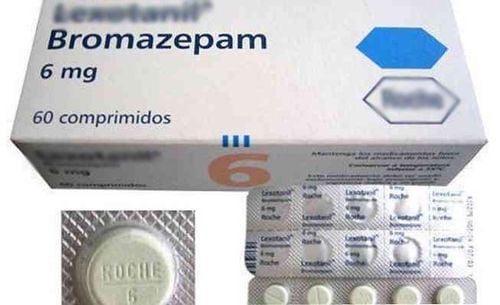This is an automatically translated article.
Akinetone is used to control serious muscle reactions and other side effects from certain medicines used to treat nausea or severe neurological, psychiatric, or emotional disturbances. To better understand what akinetone is, what are the uses of akineton, let's learn more in the article below.
1. What is aketone?
Akineton is an antiparkinsonian drug and an inhibitor of cholinergic transmission in the central nervous system. Akinet is available in tablet form and each tablet contains 2mg of the active ingredient - biperidin hydrochloride. The main auxiliary substances are: lactose monohydrate, corn starch, calcium hydrophosphate dihydrate, MCC, talc, copovidone, purified water and magnesium stearate.
2. Drug interactions
Although certain drugs should not be used together at all, in other cases two different drugs can be used together even if a drug interaction is possible. In these cases your doctor may want to change the dosage, or other precautions may be necessary. When you are using this medicine, it is especially important that your healthcare professional know if you are taking any of the medicines listed below. The following interactions have been selected on the basis of their potential significance and are not necessarily all-inclusive.
It is not recommended to use this medicine with any of the drugs below. Your doctor will decide not to treat you with this medicine or change some of the other medicines you take.
Potassium Using this medicine with any of the following medicines is generally not recommended, but may be required in some cases. If both medicines are prescribed together, your doctor may have to change how much or how often you use one or both of them.
Clozapine Glucagon Glycopyrrolate Glycopyrronium Tosylate Methacholine Metoclopramide Quetiapine Revefenacin Scopolamine Secretin Human Tiotropium Using this medicine with any of the following medicines may increase your risk of some side effects, but using both medicines may increase your risk of side effects. may be the best treatment for you. If both medicines are prescribed together, your doctor may change how much or how often you use one or both medicines.
Betel nut Interactions with food/tobacco/alcohol
Some medications should not be taken at or around the time of eating food or eating certain foods because of possible interactions. Using alcohol or tobacco with certain medications can also lead to interactions. Discuss with your health care professional the use of medicines with food and alcohol or tobacco.
3. What are the uses of aketone?
Akinetone is used to treat:
Parkinson's syndrome in adults; Poisoning with substances containing phosphorus or nicotine in adults; Extrapyramidal symptoms in adults and children, caused by sedatives and similar drugs.
4. Before using Akineton
When deciding to use a drug, the risks of using the drug must be weighed against the benefits it offers. This is a decision for you and your doctor. For this medicine you need to consider the following:
Allergies
Tell your doctor if you have ever had any unusual or allergic reaction to this or any other medicine . Also tell your healthcare professional if you have any other allergies, such as to foods, dyes, preservatives, or animals. For over-the-counter products, read labels or packaging ingredients carefully.
Pediatrics
Appropriate studies have not been performed on the relationship of age to the effects of biperiden in the pediatric population. Safety and efficacy have not yet been established.
Geriatrics
No information is available on the relationship of age to the effects of biperiden in geriatric patients. However, elderly men are more likely to have age-related prostate problems, which may require caution in patients taking biperiden.
Breastfeeding
There are no adequate studies in women to determine risks to the infant when using this medicine while breast-feeding. Weigh the potential benefits against the possible risks before taking this medicine while breast-feeding.
5. How to use Akineton effectively
Biperiden is used alone or together with other medicines (eg, levodopa) to treat Parkinson's disease. By improving muscle control and reducing stiffness, this medication allows the body to move more normally as symptoms subside.
Biperiden is also used to control serious muscle reactions and other side effects from certain medicines used to treat severe nausea or neurological, mental, or emotional conditions (eg. : chlorpromazine [Thorazine®], perphenazine [Trilafon®], prochlorperazine [Compazine® ], promethazine [Phenergan®], thioridazine [Mellaril®]).
This medicine is only available with a doctor's prescription.
Use Akineton correctly
Taking this medicine every day exactly as prescribed by your doctor will help improve your condition as much as possible. Do not use more of it, do not use it more often, and do not take it for a longer time than directed by your doctor.
You can take this medicine with food to reduce stomach irritation.
6. Other medical problems associated with the use of akineton
The presence of other medical problems may affect the use of this medicine. Make sure you tell your doctor if you have any other medical problems, especially:
Intestinal obstruction or Glaucoma, narrow angle or Megacolon (enlarged colon)—Not recommended for patients with these conditions. Enlarged Prostate or Epilepsy (convulsions) or Glaucoma or Problems with your heart rhythm — Use with caution. May make conditions worse.
7. Dosage of Akineton
The dose of this medicine will be different for each different patient. Follow your doctor's orders or directions on the label. The following information also includes only the average doses of this medicine. If your dose is different do not change it unless your doctor tells you to.
The amount of medicine you use depends on the strength of the medicine. In addition, the number of doses you use each day, the time allowed between doses, and the length of time you take the medicine depend on the medical problem for which you are using the medicine.
For oral dosage form (tablets): The drug should be taken during or after a meal with a liquid. When prescribing treatment Akineton usually starts with small doses, and then gradually increases them, depending on the presence of side effects and therapeutic action.
When the dyskinesia is caused by the effect of the drug, adults are prescribed 1-4 mg, 1-4 times a day, depending on the severity of the symptoms. Children under 15 years old - 1-2 mg 1-3 times a day.
For side effects caused by other drugs: Adults — 2 milligrams (mg) one to three times daily.
Children — Use and dosage will have to be determined by your doctor.
For Parkinson's disease: In Parkinson's disease, adults are prescribed 1 mg of the drug 1-2 times a day. The dose can be increased by 2 mg per day. The maximum daily dose is 16 mg. The total daily dose is evenly distributed to the administration throughout the day. Adults — At first, 2 milligrams (mg) three or four times daily. Your doctor may increase your dose as needed. However, the dose will usually not exceed 16 mg per day. Children — Use and dosage will have to be determined by your doctor. Missed dose
If you miss a dose of this medicine take it as soon as possible. However, if it is almost time for your next dose, skip the missed dose and go back to your usual dosing schedule. Do not double the dose.
8. Notes when using Akineton
It is important that your doctor check your progress at regular visits to allow for changes in your dosage and to check for any unwanted effects.
If you have any unusual or strange thoughts and behavior while taking biperiden, discuss it with your doctor. Some of the changes that have happened to people taking this medicine are the same as those seen in people who drink too much alcohol. Other possible changes would be confusion, worsening depression, visual hallucinations (seeing things that aren't there), suicidal thoughts and unusual excitement, anxiety or irritability.
Biperiden may cause drowsiness, difficulty controlling movements, or difficulty thinking or seeing clearly. Make sure you know your reaction to this medicine before you drive, use machines, or do other work that requires you to be alert and well-coordinated or to be able to think or see well.
This medicine will increase the effects of alcohol and other CNS depressants (medicines that make you drowsy or less alert). Some examples of CNS depressants are antihistamines or medicines for hay fever or colds; sedatives, tranquilizers or sleeping pills; prescription pain relievers or narcotics; tranquilizers or seizure medications; muscle relaxants; or anesthetics, including some dental anesthetics. Check with your doctor right before taking any of the above while you are taking this medicine.
9. Akineton side effects
Along with the necessary effects, the medicine can cause some unwanted effects. Although not all of these side effects are possible, if they do they may require medical attention.
Check with your doctor right away if any of the following side effects occur:
Anxiety Chest pain or discomfort Chills Cold sweats Confusion Confusion about identity, location and time Decreased frequency of urinating Decreased amount of urine Difficulty urinating (watery urine) Disordered behavior Dizziness, fainting, or lightheadedness when you get up from a lying or sitting position Dry mouth A false sense of well-being or abnormally hyperventilation abnormality Get emergency help right away if you experience any of the following overdose symptoms:
Overdose symptoms
Changes in consciousness Chest pain or discomfort Convulsions Decreased awareness or reactions Decreased secretion secretions of the mouth, pharynx, nose, or bronchi Delusions of persecution, distrust, suspicion, or fighting Dizziness Dry mouth Dilated pupils Hot or hot to the touch Fainting Fast, slow, pounding and irregular heartbeat or breath Bad breath Holding false beliefs that reality can't be changed Feeling lightheaded Loss of consciousness Loss of consciousness Stops breathing, blushes, sees, hears, or feels things that aren't there Severe drowsiness Tremors and unsteadiness in walking Difficulty sitting still Unsteadiness, tremors, or other problems with muscle control or coordination Unusual excitement and anxiety or restlessness Dry, warm skin Some side effects can occur that usually do not require medical attention. These side effects will likely go away during treatment as your body adapts to the medicine. Additionally, your healthcare professional will tell you about ways to prevent or reduce some of these side effects. Check with your healthcare professional if any of the following side effects continue or are bothersome or if you have any questions about them:
Blurred vision Difficulty having bowel movements (stools) Drowsiness Nausea Vomiting Other side effects not listed may also occur in some patients. If you notice any other effects check with your healthcare professional.
10. Preservation of Akineton
Store the medicine in the sealed container at room temperature, away from heat, moisture and direct light. Not frozen.
Keep out of reach of CHILDREN.
Medicines that have expired or are no longer needed should not be kept.
Ask your healthcare professional how you should dispose of any medications you are not using.
Please dial HOTLINE for more information or register for an appointment HERE. Download MyVinmec app to make appointments faster and to manage your bookings easily.













